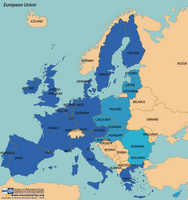 One of the greatest aspects of the internet is the ability we have now to read news from all over the world. There are a number of international news web sites that I check regularly. I just wish I could read more than English, Spanish and a touch of French. How interesting, for example, to read Hindi, Chinese, Arabic or Russian, to see what they're saying about global events. One can get English-language news from most of these areas, and it's interesting, but I always wonder how it compares to the native press. When La Reina and I returned from living in Spain for several years, one of the biggest culture shocks we received was to see how soft and incomplete news coverage had become in the U.S. In the lead-up to the war in Iraq, it became even more clear to me how important it was to get news from around the world. American Journalism reached a nadir, I believe, between 2000 and 2003. While it's gotten somewhat better since then, I still find it lacking.
One of the greatest aspects of the internet is the ability we have now to read news from all over the world. There are a number of international news web sites that I check regularly. I just wish I could read more than English, Spanish and a touch of French. How interesting, for example, to read Hindi, Chinese, Arabic or Russian, to see what they're saying about global events. One can get English-language news from most of these areas, and it's interesting, but I always wonder how it compares to the native press. When La Reina and I returned from living in Spain for several years, one of the biggest culture shocks we received was to see how soft and incomplete news coverage had become in the U.S. In the lead-up to the war in Iraq, it became even more clear to me how important it was to get news from around the world. American Journalism reached a nadir, I believe, between 2000 and 2003. While it's gotten somewhat better since then, I still find it lacking.
One web site that particularly impressed me in the lead-up to the war was The Guardian, from the UK. I can't remember now how many important stories I saw there that eventually made it across the Atlantic - after 6 months to a year. They still offer interesting stories that don't get covered here - at least right away. Here are some bits and pieces I found recently that I haven't seen over here:
CIA tried to silence EU on torture flights
Richard Norton-Taylor
According to a secret intelligence report, the CIA offered to let Germany have access to one of its citizens, an al-Qaida suspect being held in a Moroccan cell. But the US secret agents demanded that in return, Berlin should cooperate and "avert pressure from EU" over human rights abuses in the north African country. The report describes Morocco as a "valuable partner in the fight against terrorism".So the Bush administration is not only trying to silence U.S. critics of its torture and rendition policies, but it's trying to shut up the Europeans as well. And though the CIA may no longer host annual dinners for New York Times reporters, they obviously have other methods of influencing the press here and abroad.
The classified documents prepared for the German parliament last February make clear that Berlin did eventually get to see the detained suspect . . .
After the CIA offered a deal to Germany, EU countries adopted an almost universal policy of downplaying criticism of human rights records in countries where terrorist suspects have been held. They have also sidestepped questions about secret CIA flights partly because of growing evidence of their complicity.
The disclosure is among fresh revelations about how the CIA flew terrorist suspects to locations where they were tortured, and Britain's knowledge of the practice known as "secret rendition". They are contained in Ghost Plane, by Stephen Grey, the journalist who first revealed details of secret CIA flights in the Guardian a year ago. More than 200 CIA flights have passed through Britain, records show.
If we miss this last chance, then our soldiers will have died in vain
Timothy Garton Ash
Nobel prize-winning economist Joseph Stiglitz has estimated that the total, eventual costs of the Iraq war, "including the budgetary, social and macroeconomic costs, are likely to exceed $2 trillion" - that's $2,000,000,000,000. That would be $2,000 a head for each of the world's poorest billion people, who live (and die) on less than $1 a day.I thought $400,000,000,000 was bad enough, but I've never seen a figure like this in our media. Ash's column is actually in favor of keeping the U.S. and the U.K. in Iraq, but he doesn't pull any punches on how bad things have been up to this point.
 Blair-Bush ties hamper Europe, says Schröder
Blair-Bush ties hamper Europe, says SchröderJess Smee
Former German chancellor Gerhard Schröder has written a damning critique of Tony Blair's special relationship with the United States, saying it hampered Britain's links with Europe.I found this interesting because it's the first time I've seen a major European leader discuss an issue that's only going to become more important in time. The creation of the European Union as an economic and political power must lead eventually, it seems, to the development of their own military and a reconsideration of their relationship with the United States. The invasion of Iraq forced a crisis on the EU as most countries were against the war, while a few became part of the Coalition of the Willing. Imagine if California and Kentucky decided to join the Chinese Coalition of the Willing to invade Country X, while the rest of the U.S. seriously opposed the war. You cannot have a successful "kingdom" if it's divided against itself. And I don't think the Eruopeans have spent several decades and gazillions of dollars establishing the EU to have it split apart so easily. Schröder's right to be concerned. What will England do once Blair is out of office? How long will NATO exist as it does now? How will the EU handle another situation like the invasion of Iraq? Will the significant cultural and historical differences between some of the countries in the EU eventually cause it to fall apart? How far will the U.S. (or China?) go to continue its "divide and rule" approach to the EU? England will be the key battleground in this geopolitical struggle. It will be interesting to see what happens over the next 10-20 years.
In his memoirs, Decisions: My Life in Politics, which were launched yesterday, Mr Schröder examines Mr Blair's relationship with George Bush. . . .
"In the foreseeable future, Britain will not give Europe any momentum," he said. "Quite the opposite, the country will continue to protect its role as a transatlantic mediator, even if that is to the cost of the European decision-making process."
He described how signals from Washington that they were "not amused" by a European bid to hammer out its own security policy prompted Britain to swiftly distance itself from the plans.
Both Bill Clinton and Mr Bush found that their national interests were best served by a fragmented Europe, Mr Schröder commented, which gave way to America's "divide and rule" approach to Europe, especially in relation to military, trade and economic affairs.
"But the United States could always count on its special relationship with Britain," he wrote.





















5 comments:
Interesting! Sometimes I scroll to the bottom of the Google news page, where you can click on the other countries for their news ... sadly I can only read the ones in English.
The Guardian is great - have you ever seen their poetry page?
Nice round up and commentary, cowboy. I always wonder how useful it is to comapre the member states of the EU in its framework to the states of the US in our federal system. There is a lot of Europe-wide regulation that here would be treated on a state to state basis. On the other hand, I wonder about how inevitable a United States of Europe is -- Britain will always create problems for it, and I can't see any one the member states this side of Luxemburg really wanting to give up its identity completely for the sake of one Europe-wide megastate.
I think a lot might have to do with the US. If the next couple administrations pursue the same kind of unilateral imperialistic policy that Bush has followed, I think eventually it will make it politically impossible for any British government to continue the "special relationship," and that might be the open door for a real common defense policy in Europe that excludes the US. On the other hand, if after 2008 the white house begins to display even a little sanity, it may continue.
Crystal,
Thanks a lot for the Google and Guardian tips. I appreciate it.
Liam,
I almost added a note about taking my comparison with a grain of salt, precisely for the reasons you mentioned. But I decided that the principle still holds: A Kingdom divided will fall. It doesn't matter if it's our system or the evolving one that is the EU. So, yes, one can't quite compare California to France (California has a bigger economy, for one thing!), but I don't see how any version of the EU will last if the UK continues to exist out in the middle of the Atlantic.
And of course, I didn't even mention the Spanish problem. How can the country of "El Bierzo Libre!" and "Castilla sin Leon!" ever be happy in the EU? I'm not convinced that the EU will actually last that long. So much history against it. On the other hand, a powerful and competitive economy can be a strong incentive.
Good points, William. I don't think people here realize how much our news here is trivialized, and even worse, sanitized. We're "protected" from seeing a lot.
As you may have picked up on my blog, my best friend has been living in Madrid for a number of years now. When he left he was as jingoistic and parochial as I used to be in a lot of ways, but seeing the world and the news from a European perspective was a real eye-opener for him.
Thanks, Jeff. I think it would be great if everyone on the planet had to live in a different culture for two years. Then, maybe, we'd all realize that we're just sharing space on this funny, spinning globe.
Post a Comment